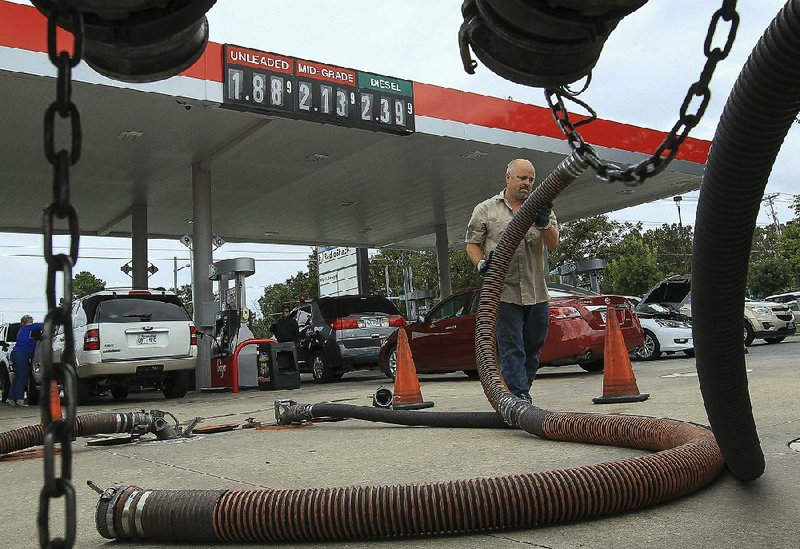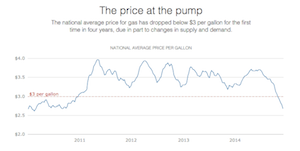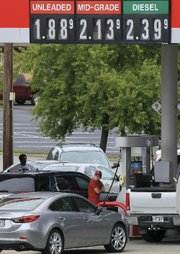Retail gasoline prices, at their lowest in 11 years over the Labor Day weekend, are set to tumble even further this year to a national average of just over $2 a gallon, according to a report released Wednesday.
Gasoline at the pump is expected to drop to a national average of $2.03 a gallon by December, according to a report by the U.S. Energy Information Administration.
The average price of gasoline in Arkansas on Wednesday was $2.12 a gallon, down from $3.20 a year ago. The national average was $2.38, down from $3.43 in 2014, according to AAA's Daily Fuel Gauge.
A Sam's Club in Jonesboro, a Kroger in North Little Rock and a Murphy USA station in Sherwood had gasoline priced at $1.88 a gallon on Wednesday, the lowest in the state, according to price-tracking website gasbuddy.com. A gas station in Camden was charging $3.15 a gallon, the highest reported price in the state.
A turbulent global oil market this year has had a broad reach. At one end of the spectrum are U.S. consumers who are seeing millions of dollars in fuel savings this year. On the other side are oil companies and supporting businesses that are dealing with spending and workforce cuts.
Oil prices started to fall last year as a result of an oversupplied market and weak demand.
The price of domestic crude has dropped 17 percent this year. West Texas Intermediate crude for October delivery fell $1.79 Wednesday to settle at $44.15 a barrel on the New York Mercantile Exchange.
Overall, the economic effects of weaker oil prices are mostly positive, according to analysts and economists.
"The United States is the world's largest energy consumer so a reduction in oil ... is definitely a positive for the economy," said Rob Lutts, president and chief investment officer for Cabot Wealth Management. "It just reduces a fixed cost everybody has."
Lower gasoline prices are expected to save the average U.S. household about $750 this year, according to the energy administration.
However, consumers seem to be saving rather than spending their extra cash -- tempering the economic lift that economists expected to see as a result of the decline in energy costs.
"While the low gasoline prices seem to give you a much needed boost, I think ... people aren't as confident that the good times are here," said Phil Flynn, an energy analyst with Price Futures Group.
Economists and analysts said they are unsure why there hasn't been an uptick in consumer spending, but several mentioned stagnant wages.
Consumers aren't seeing much wage improvement, but the decline in the oil market is still good for the economy because it is cutting down on energy costs for both consumers and businesses, Lutts said.
"[Energy] bills are lower than they were a year ago," Lutts said. "It's just very, very positive."
Oil producers and service companies are bearing the brunt of the drop in oil prices. Those companies, which thrived in recent years as U.S. shale oil production took off, have made large spending cuts this year.
El Dorado's Murphy Oil Corp. cut spending by about 30 percent this year and its workforce by 7 percent in the second quarter of 2015.
Southwestern Energy Co., the leading driller in the Fayetteville Shale, eliminated 80 positions in Arkansas last month.
"Even though they are a small percentage of the economy, they are a big percentage of the job growth we saw over the last few years," Flynn said. "And they are high-paying jobs."
Energy companies are likely to continue to tighten their belts this year. The oil market remains volatile and domestic production is strong, analysts said.
The energy sector makes up about 9 percent of the U.S. economy, but the industry's slowdown is having a minimal effect, said Kathy Deck, director of the Center for Business and Economic Research at the University of Arkansas at Fayetteville.
"We are seeing these layoffs in the energy industry -- it's happening during a time that the rest of the economy is doing pretty well," she said.
A Section on 09/10/2015



